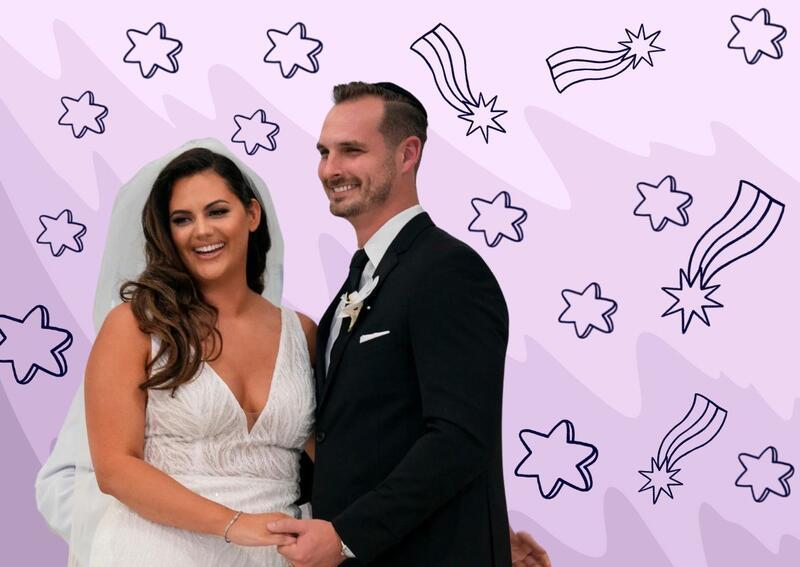Celebrating An Inter-religious Couple on Love Is Blind
Every afternoon, a reality TV show blasting through my headphones complements my after-school snack. Because of this, I’ve seen at least one episode of almost every reality show on Netflix, but Love Is Blind quickly rose the ranks as my favorite for its unique premise. Designed to test the extent to which love is affected by superficial qualities, contestants begin in “pods,” secluded rooms connected only by microphones to a matching room behind a wall. After two weeks of blind dating, partners propose to each other, as bizarre as it may sound. Each couple is then sent on a pre-wedding honeymoon to a resort destination with the other newly engaged pairs, where they all finally meet face-to-face.
Typically, I invest myself in the most dramatic couple I can find, and most Love Is Blind contestants serve this purpose nicely. In season three, though, the first openly inter-religious couple on the show caught my attention instead. Alexa Alfia, an Israeli Jewish woman coming from a wealthy family, seemed like an unlikely match for Brennon Lemieux, a quintessential Christian country boy raised in Dallas. While they ended up having one of the most loving relationships I’ve seen on the show, I was nevertheless biting my nails through each episode, worried about how Alexa’s portrayal on a hyper-edited reality TV show might affect the audience’s perception of Israeli and Jewish people.
The spark between the now-married Lemieux began with the immediate bonding over their love for shakshuka, a classic Middle Eastern dish made with eggs and tomatoes, leading them to delve deeper into their cultural identities. Brennon expressed his love for familial gatherings on Easter, while Alexa talked about a similar connection to her Jewish upbringing. I couldn’t help but notice the shift in Brennon’s facial expression when Alexa calls her family Israeli for the first time, making me automatically suspicious of Netflix.
As a Jewish fan, it seemed as though Netflix was using a Jewish “character” to make the show look more diverse. While I know that many couples from past seasons consider faith as a point of connection, it rubbed me the wrong way that the producers seemed to focus much more intently on the religious differences of the Lemieux. Israeli and Jewish people, just by existence, are often considered controversial. For example, simply because I am Jewish, I have been harshly accused of having an opinion on Israel, with the assumption that I have a strong (and contentious) opinion, even though it is a subject I feel I know very little about. While I want to optimistically presume that Netflix merely wanted a more diverse cast, I can’t help but think they purposefully used a Jewish woman to generate conversation about their show.
My concerns grew stronger during conversations about wealth differences between the pair. I am evidently sensitive to media that involves Jewish people, but it appeared as though Love Is Blind purposefully lined up the potential for antisemitic jokes to create drama. In the final days before the wedding, Brennon spoke more openly about his family’s financial dependence on his grandparents while growing up and his college debt. Naturally, I cringed when Alexa’s dad, in their multi-million dollar mansion, tells Brennon that a ketubah is like a prenup. While some couples do choose to include an agreement on finances in their ketubah, I would never make the claim that a ketubah is entirely comparable to a prenup. In my home, my parents’ ketubah is a beautifully decorated piece of art, with pomegranate vines circling around the words. To me, a ketubah is a declaration of love and commitment to a lifelong partner, and has little to do with money. Another tense moment comes when Alexa’s dad pulls out a set of knives and offers, jokingly, to circumcise Brennon on their first meeting. I was relieved that Brennon simply laughed, because, fortunately, Brennon never found an issue with Alexa’s Jewishness. But that doesn’t mean nobody did.
While there was no coverage of it on the show until the reunion episodes, Alexa faced antisemitism online after Love Is Blind’s third season aired. “Reading these things, of course, it’s hurtful, but I still just don’t get it,” Alexa said in an interview with The Jewish News of Northern California. “What do you want me to do? Do you want me to stop being Jewish, is that what you want?” As I myself face antisemitism at my diverse and large public high school (including drawings of swastikas on desks), I have become increasingly worried about how I may be forced to confront antisemitism during my future relationships.
Although I was somewhat unimpressed by Love Is Blind’s surface-level coverage of inter-religious relationships, it was beautiful to watch the Lemieux fall in love despite their very different backgrounds. I held my breath through every episode, hoping that their relationship would not fall victim to the “real world” (including all issues of superficial qualities, as well as deep-rooted ones like antisemitism) outside the pods. But the connection between the Lemieux never faltered.
It was refreshing to see an inter-religious relationship represented on a mainstream TV program that did not have tension over their religious differences, even when Netflix seemed to push the boundaries numerous times. The Lemieux serve as a perfect example of a couple that can appreciate differences without centering their lives around them. After knowing Alexa for less than two weeks, Brennon reflected that he previously should have focused on finding someone that viewed love in the same way as him. “I think this whole experience is very rare, and it shouldn’t be,” he said. When the glass finally smashed under the chuppah at the Lemieux wedding, I was still rooting for them. If anything can be taken away from this season of Love Is Blind, I hope other viewers can see how love can transcend religious differences.
This piece was written as part of JWA’s Rising Voices Fellowship.







